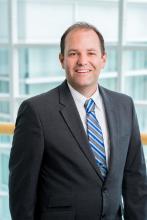Case Western Reserve University School of Medicine is preparing and inspiring a new generation of cancer investigators through Cancer-focused Summer Undergraduate Research (CanSUR). The 10-week program recently received a five-year National Institutes of Health (National Cancer Institute) research grant totaling $1.6 million. Starting in 2019, CanSUR will support 32 undergraduates each year from June through August.
“The ultimate goal is to generate excitement for future careers in cancer research,” says Mark Jackson, PhD, associate professor of pathology and Cancer Biology Training Program director at Case Western Reserve School of Medicine. “This cohort of highly-motivated undergraduates represents the next generation of talented researchers who will help conquer one of the leading causes of death in the world.”
Offered through Case Comprehensive Cancer Center (Case CCC), CanSUR establishes a strong foundation in cancer science, followed by a laboratory assignment with one of 82 Case CCC researchers studying cancer genetics, cancer cell signaling, experimental therapeutics, and cancer prevention and epidemiology research. Case CCC is a matrix center comprised of Case Western Reserve University, the Cleveland Clinic and University Hospitals Cleveland Medical Center.
“What makes our program unique is the Cancer Immersion, a week-long introduction to the fundamentals of cancer biology, current cancer therapies, and current cancer research discovery techniques,” Jackson, who is also Associate Director for Training and Education at the Case Comprehensive Cancer Center, explains. “We will use Microsoft HoloLens technology to develop three-dimensional, virtual reality modules to conceptualize how normal cells become cancerous, how they spread throughout the body, and how they develop resistance to therapy. This effort will ensure that all trainees start out with a solid understanding of cancer regardless of which mentor’s lab they join.”
In addition to performing research, the students will learn how to communicate and present research findings using innovative education techniques such as reverse classroom lectures, video abstracts, and elevator pitches. During CanSUR, graduate and medical school directors will provide guidance for preparing graduate and medical school applications.
Opportunities for students to establish personal and professional relationships are numerous. Throughout the summer, CanSUR features weekly lunches and dinners focused on cancer-related topics. The program facilitates mingling with PhD and MD students, postdoctoral scholars, and hematology/oncology residents and fellows, helping CanSUR scholars learn about diverse career paths ranging from Case Western Reserve PhD and MD/PhD programs and medical practice to community outreach and industry.
Closely involved with CanSUR program has been Goutham Narla, MD, PhD, who sat on the School of Medicine’s Medical Scientist Training Program (MSTP) Steering Committee. Narla is now Chief, Division of Genetic Medicine at University of Michigan.
“Summer research programs allow undergraduates who are thinking about a graduate or medical degree to experience life in a research laboratory,” Jackson says. “This becomes a distinct advantage during graduate or medical school interviews. Our intent is to develop a nationally recognized program at Case Western Reserve that helps recruit top performing undergraduates from across the country and create a pipeline for our training programs.”
A stipend will be provided, and housing and travel allowances will be available for select appointees.
The CanSUR program application portal will be open by December 1, 2018. For more information visit http://cancer.case.edu/training-education/CanSUR.
###
For more information about Case Western Reserve University School of Medicine, please visit: case.edu/medicine.
For more information about Case Comprehensive Cancer Center, please visit: case.edu/cancer.
Media Contact(s):
Ansley Gogol
Case Western Reserve University
School of Medicine
Office: 216-368-4452
Ansley.Gogol@case.edu


